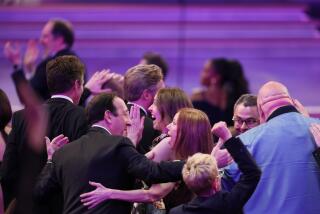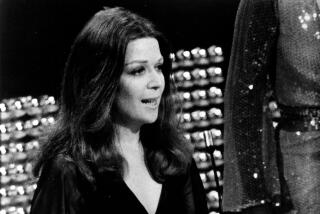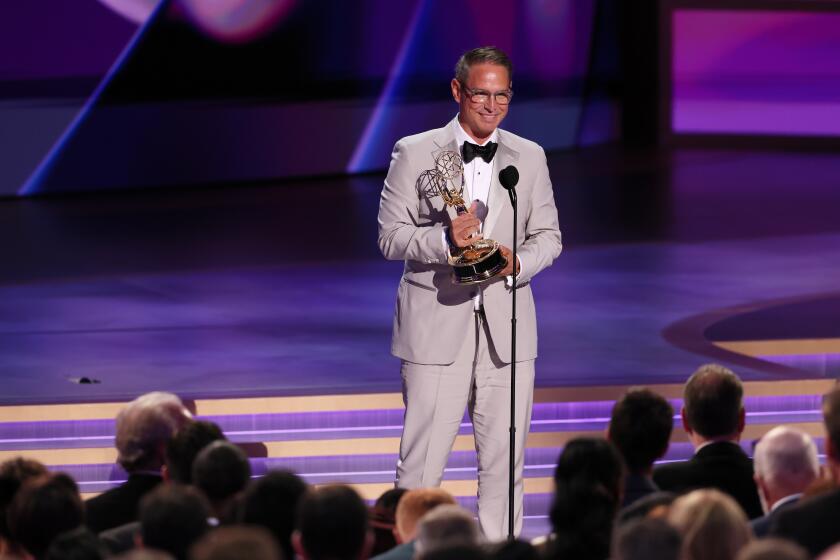‘Watchmen’ began as an ‘experiment.’ It became an Emmy winner for our troubled times
- Share via
When HBO announced three years ago that Damon Lindelof would be rebooting the celebrated comic book franchise “Watchmen,” hardcore fans greeted the news with equal parts anticipation and skepticism. Alan Moore and Dave Gibbons’ beloved 1987 graphic novel had been adapted before, and not very well, when Zack Snyder brought it to the screen with a widely panned 2009 film. Snyder had, in fact, been tapped for another go-round, until HBO went with Lindelof instead.
Lindelof, known for his work on “Lost” and “The Leftovers,” realized that expectations would be high. But though he understood it would be risky, he believed his plan to blend the fantastic “Watchmen” superhero universe with volatile issues such as racism, police brutality and the rise of white supremacy could approach the art that Moore and Gibbons created.
Those convictions were affirmed Sunday as “Watchmen” became one of the biggest winners at the 72nd Emmy Awards. The series, which entered the evening as the most-nominated show, earned four awards, including prizes for limited series and lead actress Regina King, with 11 Emmys overall.
The series also won for writing for Lindelof and Cord Jefferson and supporting actor Yahya Abdul-Mateen II.
Now that it’s all over, maybe, just maybe, Lindelof can relax. (But knowing him, probably not.)
“Every week an episode aired, I was scared that it was going to be misunderstood, that it was going to be more harmful than helpful,” Lindelof told The Times in the days leading up to the awards. “I feared that it was going to be seen as tone-deaf, and that no one was going to give me points for being this close.”
Really, though, the Emmys are beside the point. The true legacy of “Watchmen” will be the ways it has resonated and dovetailed with hot-button issues gripping the country, particularly around race relations. The series was instrumental in putting a spotlight on the 1921 Tulsa race massacre, a relatively little-known chapter of America’s past despite being one of the worst incidents of racial violence in the country’s history.
Lindelof, who wore a T-shirt that read “Remember Tulsa ‘21” on Sunday, learned about the event through author Ta-Nehisi Coates, who frequently writes about Black identity and white supremacy. King already knew the details, having long wanted to make a project depicting the two days of murder and destruction carried out by white residents upon the prosperous area of Tulsa known as Black Wall Street.
Watch here for live updates on the 2020 Emmys from the Los Angeles Times: Predictions, red-carpet fashion, winners and nominees, the COVID-19-affected telecast and more.
“When you talk about people not knowing about Tulsa, it’s the majority of us,” King told The Times recently. “No matter what your history was. No matter what your complexion was. Most of us did not know about that before the first [‘Watchmen’] episode came out because the schools never taught it. I like to consider myself someone who goes the extra mile to get more information, and I didn’t learn about Tulsa until my late teens. How is that possible?”
“The fires that destroyed Black Wall Street still burn today and the only way to put them out is to fight them together,” Lindelof added in his acceptance speech Sunday.
Viewers unaware of this history experienced a steep learning curve in October when “Watchmen’s” first episode opened with scenes depicting white mobs murdering Black people in Tulsa and laying waste to what was then the wealthiest Black community in the United States. “Tulsa was trending for a couple of days,” King said. “People wanted to find out more.”
That world-building first episode also introduced the series’ mysterious masked vigilantes, and a modern-day America where Robert Redford is president and Black people have been given reparations for slavery. The dialogue crackled with humor (“I got a nose for white supremacy, and he smells like bleach,” King’s character, Angela Abar, says at one point), and soon enough the show unleashed squid storms, superhuman beings and blood transfusions from elephants.
“It needed to be told through the lens of fiction,” Lindelof told The Times. “With the nonfiction lens, people won’t watch it. It feels like salad, like making people take their vitamins. So you have to take the lettuce from the salad and put it on a cheeseburger in order to get people. It’s sad that’s the way it is, but ‘Watchmen’ was the perfect vessel, the perfect Trojan horse to put those ideas in because it was a text that was all about ‘justice.’”
The series’ examination of America’s history of systemic racism made headlines when “Watchmen” aired in the fall and resonated again following the death of George Floyd at the hands of Minneapolis police in May. Fury over Floyd’s death as well as the police killing of Breonna Taylor in Louisville, Ky., triggered worldwide protests and tense demonstrations. “Watchmen” no longer seemed like the best television series of the past year. It suddenly felt like the only show that mattered.
Emmys 2020
“There’s a strong sense of inherited pain that runs through ‘Watchmen,’” King said. “And that hit people. It stayed with them.” On Sunday, she thanked Lindelof for “your brilliant mind” and for stepping “out of your comfort zone and leading us on this journey where we could speak truth to power.”
In his own remarks, Abdul-Mateen II referred to the same pain, calling “Watchmen” a story about the “lasting scars” of “white domestic terrorism.” But he also took a moment to honor the power of Black love in the face of such challenges: “It was also a story about a god who came down to Earth to reciprocate, to a Black woman, all the love that she deserved. He offered her sacrifices, support, passion, protection. And he did all that in the body of [a] Black [man], and I’m so proud that I was able to walk into those shoes.”
As he was developing the show, Lindelof often felt like the bewildered Richard Dreyfuss character in “Close Encounters of the Third Kind,” trying to sort through the barrage of ideas propelling his vision.
“I just wanted this show to mean something, but I couldn’t quite articulate what, and I’m not sure I can articulate even now after all this time what it means,” he said.
“I had all these feelings inside me — how do I feel about superheroes, how do I feel about Alan Moore, who wrote this comic book that changed the way I told stories? How do I feel about the police? How do I feel about being a white man in the midst of #MeToo, which was going on as we were writing the show?” he added. “I thought, ‘I’m just going to throw it into the show and hope that it means something.’ That was the hope.”
King doesn’t quite believe Lindelof’s humility, noting the audacity of the show’s construct.
“When do you hear of real-life historical events being portrayed in an alternative history with comic-book fodder, based on a beloved graphic novel, along with a little bit of tongue-in-cheek comedy and then a love story?” King asked, laughing. “What the hell? That can’t be a good show. If you say that out loud, that just sounds like an experiment gone horribly wrong.”
But having called “Watchmen” a beautiful “gumbo of genres” earlier in the conversation, King returns to the description.
“Most of us do love gumbo, right?” she said, smiling. Emmy voters gave it the chef’s kiss Sunday night.
Times staff writer Diego Medrano contributed to this report.
More to Read
The complete guide to home viewing
Get Screen Gab for everything about the TV shows and streaming movies everyone’s talking about.
You may occasionally receive promotional content from the Los Angeles Times.








